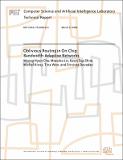Oblivious Routing in On-Chip Bandwidth-Adaptive Networks
Author(s)
Kinsy, Michel; Wen, Tina; Shim, Keun Sup; Lis, Mieszko; Cho, Myong Hyon; Devadas, Srinivas; ... Show more Show less
DownloadMIT-CSAIL-TR-2009-011.pdf (650.4Kb)
Additional downloads
Other Contributors
Computation Structures
Advisor
Srinivas Devadas
Terms of use
Metadata
Show full item recordAbstract
Oblivious routing can be implemented on simple router hardware, but network performance suffers when routes become congested. Adaptive routing attempts to avoid hot spots by re-routing flows, but requires more complex hardware to determine and configure new routing paths. We propose on-chip bandwidth-adaptive networks to mitigate the performance problems of oblivious routing and the complexity issues of adaptive routing.In a bandwidth-adaptive network, the bisection bandwidth of a network can adapt to changing network conditions. We describe one implementation of a bandwidth-adaptive network in the form of a two-dimensional mesh with adaptive bidirectional links, where the bandwidth of the link in one direction can be increased at the expense of the other direction. Efficient local intelligence is used to reconfigure each link, and this reconfiguration can be done very rapidly in response to changing traffic demands. We compare the hardware designs of a unidirectional and bidirectional link and evaluate the performance gains provided by a bandwidth-adaptive network in comparison to a conventional network under uniform and bursty traffic when oblivious routing is used.
Date issued
2009-03-27Series/Report no.
MIT-CSAIL-TR-2009-011
Keywords
bidirectional link, network router, reconfigurable network, adaptive link
Collections
The following license files are associated with this item: